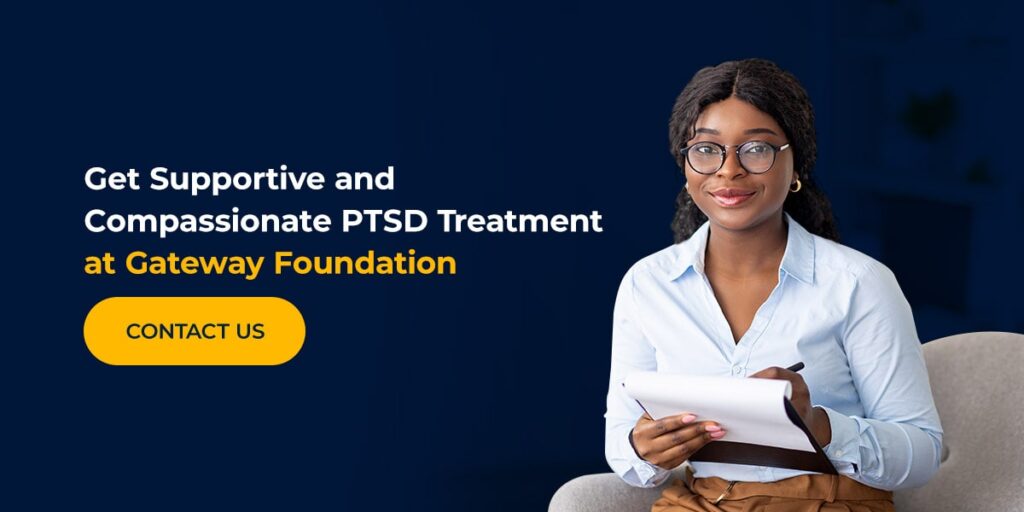- Jul 26
- Mental Health Treatment
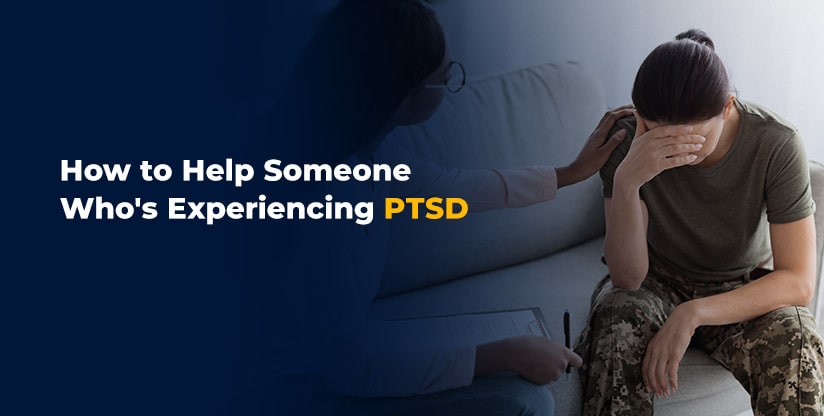
Post-traumatic stress disorder (PTSD) is a mental health condition that can severely impact a person’s life. When a partner, family member, or friend has PTSD, it can also take a heavy toll on your relationship with them. You may struggle to understand their behaviors or distance or get frustrated if they’re reluctant to open up.
It’s essential to remember that a person with PTSD might not always have control over their behaviors. As a result of their condition, they get stuck in a state of constant alert, making them feel vulnerable and unsafe or causing them to relive the traumatic experience in their minds over and over. They may lash out or become mistrustful and experience other PTSD symptoms they can’t simply turn off.
It can be challenging to know how to help someone with PTSD, but with the proper support from you and other family members and friends, you can help them regain control.
What PTSD Looks Like
PTSD is a mental health condition resulting from exposure to a traumatic event that causes extreme distress or fear. While some people think of PTSD as a disorder that affects only military veterans, PTSD can affect anyone after witnessing or living through a traumatic event, such as abuse, a natural disaster, or being diagnosed with a life-threatening condition.
Symptoms of PTSD can differ from person to person and significantly impact a person’s daily life, from their relationships to their careers. These signs typically appear within three months after someone goes through a traumatic event, though some people may not experience symptoms for years after the event.
Learning more about PTSD and its symptoms can help you better understand what your loved one is going through. It’s also the first crucial step in helping someone with this condition. The more you know about the symptoms and treatment options, the better equipped you’ll be to help your loved one.
According to the National Institute of Mental Health, people must display the following symptoms for one month to be diagnosed with PTSD:
1. Avoidance Symptoms
Avoidance behaviors might be the easiest signs of PTSD to spot in your loved one. These can include:
- Avoiding places, events, or objects that remind them of the traumatic experience.
- Shutting out thoughts or feelings related to the event.
- Avoiding daily routines associated with the event, such as avoiding driving or riding in a car after a serious car accident.
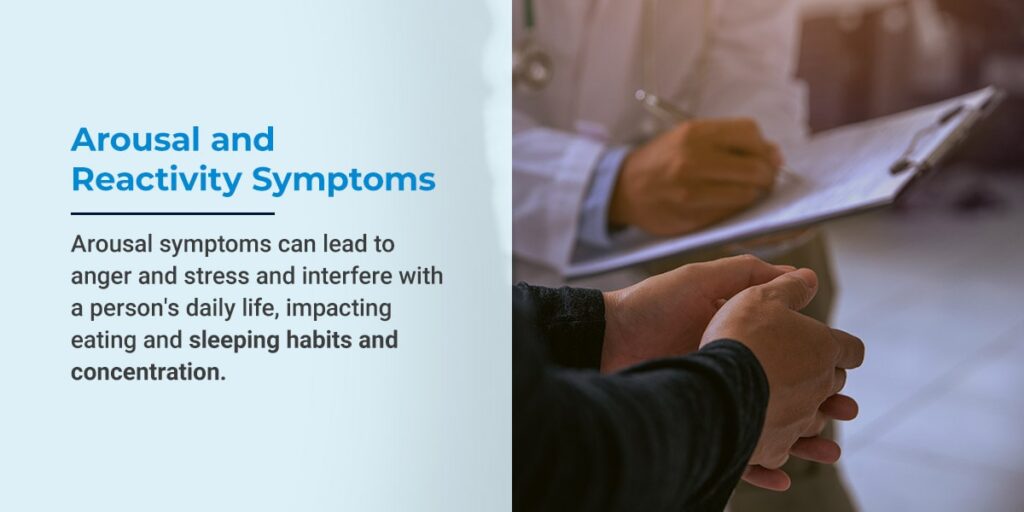
2. Arousal and Reactivity Symptoms
People with PTSD typically experience arousal and reactivity symptoms, including:
- Being easily startled.
- Having difficulty concentrating.
- Feeling highly alert, on edge, or tense.
- Having trouble falling or staying asleep.
- Having angry outbursts.
- Being irritable.
- Engaging in risky or destructive behavior.
Arousal symptoms can lead to anger and stress and interfere with a person’s daily life, impacting eating and sleeping habits and concentration.
3. Cognition and Mood Symptoms
PTSD can cause your loved one to experience cognition and mood changes, including:
- Difficulty remembering the main features of the traumatic event.
- Negative thoughts about themselves or the world.
- Trouble experiencing positive emotions like happiness or contentment.
- Ongoing negative emotions, such as anger, guilt, fear, or shame.
- Distorted perceptions about the event that cause feelings of blame.
- Loss of interest in previously enjoyed activities.
- Feelings of numbness or emotional distance from others.
Cognition and mood symptoms can start or worsen after the traumatic event and make your loved one feel detached. They may begin to isolate themselves from friends or family members due to their trauma.
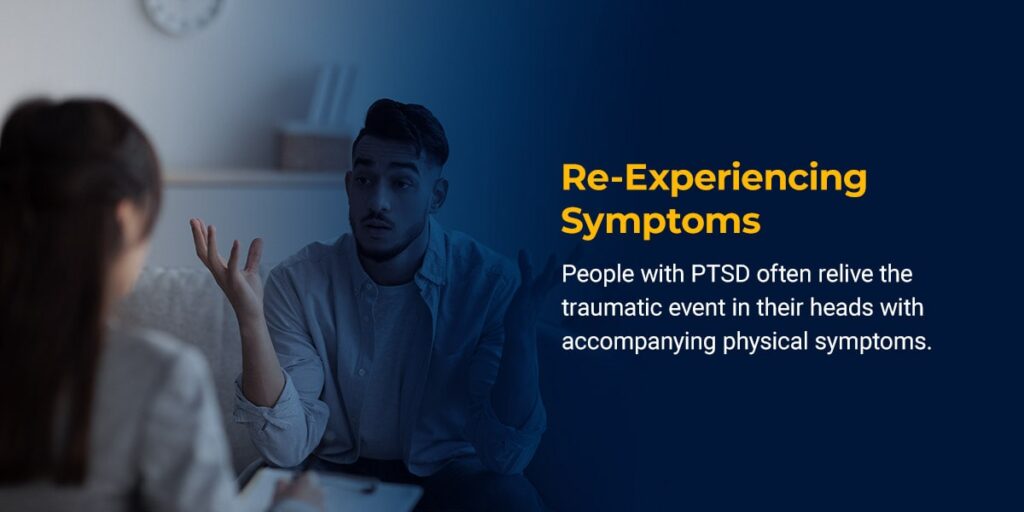
4. Re-Experiencing Symptoms
People with PTSD often relive the traumatic event in their heads with accompanying physical symptoms. The following are re-experiencing symptoms your friend may have:
- Flashbacks of the traumatic event often accompany physical symptoms like sweating or rapid heartbeat.
- Recurring dreams or memories related to the traumatic event.
- Physical signs of stress, such as panic attacks, difficulty breathing, or fatigue.
Specific thoughts and feelings can trigger re-experiencing symptoms. Situations, words, and objects can also remind them of the event and cause distressful PTSD symptoms.
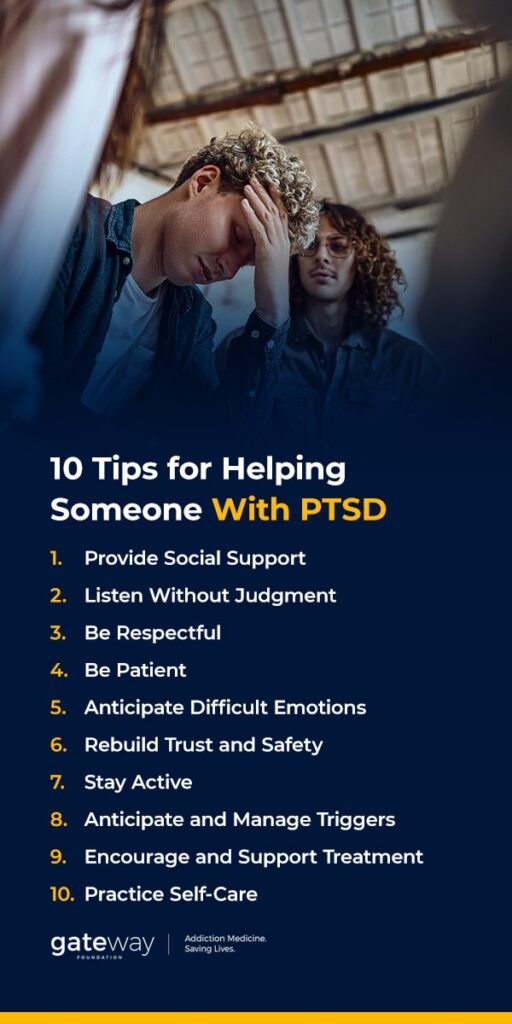
10 Tips for Helping Someone With PTSD
If you have a friend or family member who has PTSD, you might find it challenging trying to determine how to help them. While learning how to help someone with PTSD can be difficult at first, the following tips can help them feel more comfortable and encourage them to seek professional help.
1. Provide Social Support
It’s very common for people with PTSD to withdraw from friends and family members. They may feel guilty or ashamed and feel like a burden to others. It’s also possible they believe other people won’t understand what they’re going through.
While respecting their boundaries is crucial, offering your comfort and support can help them overcome feelings of depression, grief, and despair. In fact, experts believe social support is one of the most essential factors in PTSD recovery.
Knowing how to show your love and support for someone with PTSD isn’t always easy. You can’t force them to get better, but you can play a significant role in the healing process by simply spending time with them. A few tips include:
- Do activities with your loved one that isn’t associated with their PTSD or traumatic experience.
- Encourage them to spend time with friends and pursue hobbies that make them happy.
- Urge them to attend support groups to discuss their struggles with like-minded people and feel less alone.
- Schedule regular lunch dates with other friends and family.
As you plan social activities with your loved one, let them take the lead rather than telling them what to do. People with PTSD have different symptoms, but most will instinctively know what makes them feel calm and safe. Take cues from them to learn how to provide companionship and social support.
2. Listen Without Judgment
It’s important not to push someone with PTSD to talk, and it’s best to listen without judgment if they wish to share. Let them know you’re interested in what they say and that you care but don’t give advice. Listening attentively is the act that will help your loved one, not what you say.
Part of the healing process for someone with PTSD is discussing the traumatic event repeatedly. While many of the things they tell you may be challenging to hear, it’s essential to respect their feelings and reactions. Creating a safe space for them to talk about their feelings can help build trust and comfort in this difficult time.
3. Be Respectful
Be respectful of your loved one with PTSD. Avoid belittling their experiences or feelings or acting as if it didn’t happen. If you know someone with PTSD, you can avoid common communication pitfalls by trying not to:
- Give easy answers or tell them everything will be OK.
- Stop them from talking about their fears and feelings.
- Offer unsolicited advice or tell them what they “should” do.
- Blame your loved one’s PTSD for your relationship or family issues.
- Invalidate or minimize your loved one’s traumatic experience or symptoms.
- Give ultimatums or make demands.
- Take over with your personal experiences or feelings.
4. Be Patient
Recovery is a process that takes a lot of time and involves setbacks. The important thing for you to do is stay positive and patient while maintaining support for your loved one. As mentioned, don’t pressure them into talking. While some people may feel better about discussing traumatic events, others can feel worse discussing them. Be patient and let them know you’re willing to listen if they want to talk.
It’s also crucial to be patient when it comes to mood changes. Many people with PTSD experience a lot of irritability, anger, and depression. Anticipate these symptoms in your loved one and expect to encounter your own mix of emotions at this time. Remember that having negative feelings toward them doesn’t mean you don’t love them and be patient through the recovery process.
5. Anticipate Difficult Emotions
People with PTSD can have trouble managing their emotions. This may manifest in moodiness, irritability, or angry outbursts in your loved one. People struggling with PTSD live in a state of physical and emotional distress. They’ll often have trouble sleeping, which can contribute to mental and physical exhaustion, increasing the likelihood they overreact to everyday stressors.
For others with PTSD, anger can be a mask for their feelings of depression, helplessness, and guilt. Anger can make them feel stronger instead of vulnerable. Others try to suppress their anger until it erupts unexpectedly. Watch for signs of anger in your loved one, such as being agitated or clenching jaws or fists.
You can defuse the situation by spotting the warning signs and taking action:
- Remain calm to communicate to your loved one that everything is OK.
- Give the person space to avoid making them feel threatened.
- Ask how you can help or suggest a change of scenery.
In any case, always put safety first. If your attempt to calm your loved one down doesn’t help, put distance between them and yourself and call for help if you fear your loved one may hurt themselves or others.
6. Rebuild Trust and Safety
Trauma significantly affects how a person sees the world and may make them perceive it as dangerous and frightening. It can also damage a person’s ability to trust others and themselves. You might try the following tips to help rebuild your friend’s sense of trust and contribute to their overall recovery:
- Express your dedication to the relationship: Let your friend or loved one know you’re with them for the long haul, so they feel supported and valued.
- Create routines: Predictable daily schedules can restore a sense of stability and security for people with PTSD. This might look like helping your loved one with groceries or housework.
- Minimize stress at home: Create a safe space for your loved one at home where they can rest and relax on their own.
- Keep your promises: You can build trust with your loved one by staying consistent and following through on what you say you’ll do.
- Emphasize your loved one’s strengths: Encourage your friend in recovery by telling them you believe they’re capable of healing and pointing out their positive qualities and successes.
- Look for opportunities to empower them: Help build your loved one’s confidence by giving them choices and control.
7. Stay Active
Exercise is essential for health and will help clear the mind. One study found regular exercise could help someone with PTSD from war experiences, reducing military veterans’ odds of developing new PTSD symptoms or having persistent symptoms.
Exercise can also help you as you care for your friend or family member struggling with PTSD. You might participate in a rhythmic activity with your friend or family member, like running, swimming, walking, or rock climbing. Taking a fitness or dance class can also be a fun physical activity you can do together.
8. Anticipate and Manage Triggers
PTSD triggers can be anything that reminds your loved one of the trauma and causes them to experience symptoms, such as flashbacks. Sometimes, triggers are apparent, while others can take time to identify and understand. Internal feelings can also trigger PTSD symptoms, so it can be challenging to recognize them.
Ask your loved one how you should respond when they’re experiencing symptoms of PTSD. Creating a safe space for these moments can make them less overwhelming and put you in a better place to help them calm down.
For instance, a flashback can make a person disassociate, or feel as if they’re detached from their own body. You might remind your loved one their flashback isn’t real, even though it may feel like it. Grounding techniques can also help with PTSD triggers by reminding them of their immediate surroundings and encouraging them to take deep, slow breaths to prevent panic.
9. Encourage and Support Treatment
While it’s beyond your control to make someone seek professional PTSD treatment, you can encourage your loved one to do so with the following tips:
- Emphasize the benefits: Research the many treatment options for PTSD and their benefits and share them with your loved one when they’re ready. For example, therapy and support groups can provide validation and empowerment to overcome PTSD-related challenges and be more in control. Strategies learned in therapy can also help someone with PTSD sleep better and maintain a regular, healthy routine.
- Wait for the right time to raise your concerns: Don’t bring up treatment during a crisis or particularly difficult time. Be careful to frame your concerns positively and practically.
- Focus on specific problems: Discuss how treatment can help with particular issues, such as anxiety, concentration, or anger management.
Additionally, you can support your friend’s recovery by taking them to doctor visits or helping them keep track of appointments.
10. Practice Self-Care
To gain the strength to be there for yourself and your loved one, it’s essential to nurture and care for yourself. Ignoring your needs can cause burnout and make it challenging to help your loved one with PTSD. It’s also possible to experience vicarious trauma, or secondary trauma, by listening to their stories or witnessing symptoms like flashbacks.
Take care of your physical needs by getting enough sleep, eating properly, and exercising regularly. Lean on a therapist, trusted friend, or family member to cultivate your support system. Of course, make time for yourself and set boundaries to help manage stress and stay relaxed.
Get Supportive and Compassionate PTSD Treatment at Gateway Foundation
There are so many ways you can support someone with PTSD. Listening to them and encouraging healthy activities are essential. When you need extra help, Gateway Foundation can provide several treatment options to help your loved one. Our highly experienced therapists promote a safe and supportive environment for people to overcome their PTSD struggles and improve their quality of life.
Through professional therapy, your loved one can learn how to identify triggers, reduce PTSD symptoms and healthily process emotions. We also offer support groups to help patients gain a sense of validation and encouragement to recover from their trauma.
To learn more about how we can support your loved one’s PTSD recovery, contact us today.

